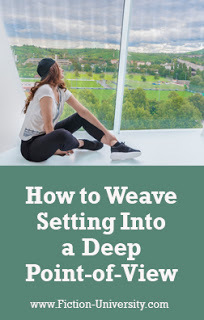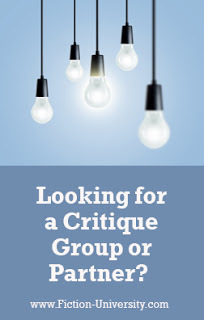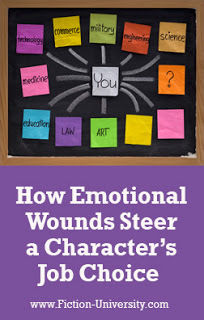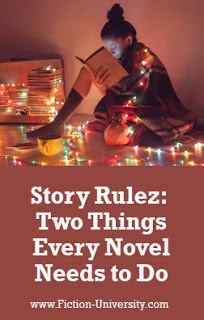Janice Hardy's Blog, page 43
July 28, 2020
How to Weave Setting Into a Deep Point-of-View
 By Bonnie Randall
By Bonnie RandallPart of The How They Do It Series
JH: A sense of place can transport a reader to your story's world. Bonnie Randall shares tips on how deep point of view can enhance your novel's settings.
The art of Deep Point-of-View projects everything within a scene through the unique lens of a character. Deep POV incorporates the goal / motivation / current conflict into this projection, but is also mindful of many other variables that make up the character, including:
Gender Age Culture Ethnicity Geography Era/Generation Education / lack thereof Profession Beliefs World View Values History (And others).Continue ReadingWritten by Janice Hardy. Fiction-University.com
Published on July 28, 2020 03:00
July 26, 2020
Are You Looking for a Critique Group or Partner?
 By Janice Hardy, @Janice_Hardy
By Janice Hardy, @Janice_HardyIt's Critique Time Again! The 2020 Summer Group is now open!
So, this morning I realized I'd completely forgotten to re-open the group on July 1 like I usually do. I blame the ongoing distraction of Corona brain. I never thought I'd need a calendar reminder to do this, but clearly, I do. I'll set one for January right after I'm done here.
Without further ado...
Back in 2013 I started a Yahoo Group called "Janice Hardy's Critique Connection" to help writers connect with like-minded folks looking for critique groups or partners. It was designed to help people find long-term, quality writing partners, not just places you can toss up your work and get quick feedback.
It went from a one-time event to annually, and now to every six months (I open it up every January and July). It's switched to Groups.io now, but it's the same group.
If you're looking to join or create a critique group, add more to your existing group, or find a critique partner, odds are you'll find someone here.
Continue ReadingWritten by Janice Hardy. Fiction-University.com
Published on July 26, 2020 04:41
July 25, 2020
WIP Diagnostic: Is This Working? A Closer Look at Show, Don’t Tell in an Opening Page
 Critique By Janice Hardy, @Janice_Hardy
Critique By Janice Hardy, @Janice_HardyWIP Diagnostics is a weekly column that studies a snippet of a work in progress for specific issues. Readers are encouraged to send in work with questions, and we diagnose it on the site. It’s part critique, part example, and designed to help the submitter as well as anyone else having a similar problem.
If you're interested in submitting to WIP Diagnostics, please check out these guidelines.
Submissions currently in the queue: One
Please Note: As of today, critique slots are booked through August 1.
This week’s questions:
1. Does the beginning sound too adult?
2. Is there enough of a hook in the scene?
3. Is this beginning being shown or told?
4. How would you describe the narrative distance?
5. Based on its beginning, and the information in the included note, do you think it would be an appropriate story for 7th and 8th graders?
Market/Genre: Young Adult
On to the diagnosis…
Continue ReadingWritten by Janice Hardy. Fiction-University.com
Published on July 25, 2020 06:15
July 23, 2020
How to Create a Free Book Trailer Using Adobe Spark
 By Chrys Fey, @ChrysFey
By Chrys Fey, @ChrysFeyPart of The Indie Author Series
JH: Creating a book trailer is a lot easier than you might think. Chrys Fey explains step by step how to bring your book to the "little screen" with Adobe Spark.
Chrys Fey is the author of the award-winning book Write with Fey: 10 Sparks to Guide You from Idea to Publication . She is also the author of the Disaster Crimes series. Visit her blog, Write with Fey, for more tips.
Website | Facebook | Twitter | Goodreads | Blog | Newsletter
Take it away Chrys…
Continue ReadingWritten by Janice Hardy. Fiction-University.com
Published on July 23, 2020 03:06
July 18, 2020
WIP Diagnostic: Is This Working? A Closer Look at Revising Your Opening Scene
 Critique By Maria D'Marco
Critique By Maria D'Marco WIP Diagnostics is a weekly column that studies a snippet of a work in progress for specific issues. Readers are encouraged to send in work with questions, and we diagnose it on the site. It’s part critique, part example, and designed to help the submitter as well as anyone else having a similar problem.
If you're interested in submitting to WIP Diagnostics, please check out these guidelines.
Submissions currently in the queue: Two
Please Note: As of today, critique slots are booked through August 1.
This week’s questions:
1. What writing aspects are most needed to add/delete from this scene? (i.e. More showing, more intriguing issue/problem to start, action, pacing, clearer storyline? etc.)
2. What does/doesn’t work with this scene?
Market/Genre: Romantic Suspense
Note: This is a revision of a previous submission.
On to the diagnosis…
Continue ReadingWritten by Janice Hardy. Fiction-University.com
Published on July 18, 2020 04:34
July 16, 2020
Crafting Deep Fiction: How Emotional Wounds Can Steer a Character’s Job Choice
 By Angela Ackerman, @AngelaAckerman
By Angela Ackerman, @AngelaAckermanPart of The Writer’s Life Series
JH: What a character does for a living is an opportunity to deepen that character and your story. Angela Ackerman shares tips on how to use emotional wounds to steer a character's job choice.
Angela Ackerman is a writing coach, international speaker, and co-author of the bestselling book, The Emotion Thesaurus and its many sequels. Her books are available in eight languages, are sourced by US universities, recommended by agents and editors, and are used by novelists, screenwriters, and psychologists around the world. To date, this book collection has sold over half a million copies.
Angela is also the co-founder of the popular site Writers Helping Writers, as well as One Stop for Writers, a portal to game-changing tools and resources that enable writers to craft powerful fiction.
Website | Facebook | Twitter | Instagram
Take it away Angela...
Continue ReadingWritten by Janice Hardy. Fiction-University.com
Published on July 16, 2020 03:00
July 14, 2020
4 Free Must-Have Writing Apps
 By Laurence MacNaughton, @LMacNaughton
By Laurence MacNaughton, @LMacNaughtonPart of The Writer's Life Series
JH: Finding the right software for the right job isn't easy, but what we write with can make a difference in how productive we are. Laurence MacNaughton shares four great (and free) writing apps every writer needs.
Writers can't afford to mess around with software unless it actually helps you write better and faster. As a writer, my livelihood depends on producing results on a daily basis. With that in mind, I've put together a short list of apps that every writer desperately needs.
Shockingly, Google Docs, Evernote, and Grammarly didn't make it onto my list. But some surprising ones did.
The apps below are the real deal. I use them every day. They are either free, or offer a generous free trial period. That way, you don't have to spend a dime to start becoming a faster, better, and happier writer, starting today.
Continue ReadingWritten by Janice Hardy. Fiction-University.com
Published on July 14, 2020 03:18
July 13, 2020
Story Rulez: Two Things Every Novel Needs to Do
 By Janice Hardy, @Janice_Hardy
By Janice Hardy, @Janice_HardyThere are a lot of rules in writing, but only two you really need to follow.
I'm a big fan of the story. If I had to chose between a great story and great writing, I'd take story every time, because without a great story, who cares about the writing? I've seen wonderfully written manuals, but that didn't make me want to curl up with them in front of a fire.
I've gotten myself into some debates over which is more important to a new writer. Should they focus on improving their writing or their story?
Knowing the rules is important. Writing is a skill, and there's only so far you can go with raw talent. At some point, you'll need to know what you're doing. But I also think that no matter how good a writer you are, if you're not also a storyteller, you won't go that far either.
Most readers don't pick up a book because the author is technically skilled--they pick it up because it sounds like a good story.
Continue ReadingWritten by Janice Hardy. Fiction-University.com
Published on July 13, 2020 03:00
July 12, 2020
WIP Diagnostic: Is This Working? A Closer Look at a Middle Grade Opening
 Critique By Maria D'Marco
Critique By Maria D'Marco WIP Diagnostics is a weekly column that studies a snippet of a work in progress for specific issues. Readers are encouraged to send in work with questions, and we diagnose it on the site. It’s part critique, part example, and designed to help the submitter as well as anyone else having a similar problem.
If you're interested in submitting to WIP Diagnostics, please check out these guidelines.
Submissions currently in the queue: Three
Please Note: As of today, critique slots are booked through August 1.
This week’s question:
Is this a strong beginning and would it make a child want to know more?
Market/Genre: Middle Grade
Note from JH: Since I took the holiday off last week, I'm doubling up this week to keep on schedule. Enjoy!
On to the diagnosis…
Continue ReadingWritten by Janice Hardy. Fiction-University.com
Published on July 12, 2020 04:44
July 11, 2020
WIP Diagnostic: Is This Working? A Closer Look at Setting the Opening Scene
 Critique By Janice Hardy, @Janice_Hardy
Critique By Janice Hardy, @Janice_HardyWIP Diagnostics is a weekly column that studies a snippet of a work in progress for specific issues. Readers are encouraged to send in work with questions, and we diagnose it on the site. It’s part critique, part example, and designed to help the submitter as well as anyone else having a similar problem.
If you're interested in submitting to WIP Diagnostics, please check out these guidelines.
Submissions currently in the queue: Four
Please Note: As of today, critique slots are booked through August 1.
This week’s questions:
This is the opening of a ‘Neo Victorian Space Opera’. Sort of Captain Kirk meets Captain Hornblower. Is this short introduction is capable of inspiring the reader to keep going? Both characters become POV characters and often observe each other’s actions in this manner. Does this introduce them and the prospect of their stories? It is a YA story for young men to grow up on, mentor and trust, blended with swashbuckling and galaxy hopping adventure. Does the atmosphere begin to grow on you or is it to vague?
Market/Genre: YA Science Fiction
On to the diagnosis…
Continue ReadingWritten by Janice Hardy. Fiction-University.com
Published on July 11, 2020 05:36



